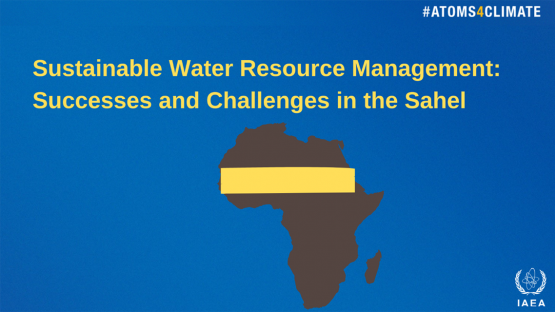Capacity building is key to achieving sustainable development but it is a complex process with a long life span. At an #Atoms4Climate side event at the United Nations Climate Change Conference (COP27) in Sharm El Sheikh, Egypt, representatives from the IAEA, the World Meteorological Organization (WMO) and the United Nations Environment Programme (UNEP) focussed on developing capacity for sustainable water resource management and its role in promoting regional cooperation and peace within Africa’s Sahel region.
The climate crisis is a water crisis, heard the event participants. The IAEA uses isotope hydrology to help address the water crisis.
“Isotope hydrology is a powerful technique that tells us about the history of water molecules, and can be incorporated into water management strategies,” explained Jodie Miller, Head of the IAEA Isotope Hydrology Section.
Isotopic hydrology is a nuclear science, where differences in the mass of different isotopic molecules of water are exploited to track the movement of water through the hydrological cycle. But, like in many other scientific areas, using isotope hydrology tools and techniques requires building capacity in countries.
“The IAEA Technical Cooperation Programme provides fellowship and training opportunities for young scientists to create a sense of community and build networks within regions,” said Christoph Henrich, a Programme Management Officer at the IAEA. The IAEA currently runs a regional technical cooperation project for Africa. This project supports MSc and PhD students, the next generation of decision makers, and brings them together to discuss common issues and solutions.
This sense of community and the creation of these networks are central to successful capacity development added Elizabeth Carabine, Climate Advisor to the UN Office of the Special Envoy for the Horn of Africa, which has a focus on peace and security. “Across the Sahel the sense of community is strong with people working together in regional projects. Such regional projects build connections between young scientists that are carried through into management and subsequently to government,” she said.
Stefan Uhlenbrook, WMO Director of Hydrosphere, Water and Cryosphere, added that climate change brings significant hydrological alteration to the Sahel that goes beyond national boundaries. “Water is a climate change problem but it can also be a solution to climate change,” he said. “One of the best investments we can make is to develop early warning systems that make society more resilient.”
Early warning systems are indeed essential for all countries of the world to mitigate the impacts of climate driven disasters such as floods and droughts. A key element for early warning systems is the availability of data and information, one of the five accelerators of Sustainable Development Goal 6, Clean Water and Sanitation for All. The IAEA supports countries in building capacity to generate isotope hydrology data that can be used to support regional water resource management. Panellists discussed the advantage of regional centres of excellence as an effective mechanism for capacity development and generation of the needed data.
The event also highlighted the role of groundwater in adaptation strategies. Isotope hydrology helps to better understand groundwater systems, which are under increasing pressure to provide the shortfall in surface water systems impacted by climate change. Groundwater provides a means of stabilising erratic surface water supplies, however understanding whether or not its use is sustainable is a critical question. Finding answers to this question requires investment in capacity building and application of innovative technologies, which the IAEA, WMO, and UNEP are committed to working together on, panellists emphasized.
You can watch the recording of the event here.




